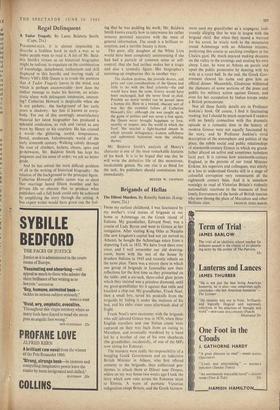Regal Delinquent
A Tudor Tragedy. By Lacey Baldwin Smith. (Cape, 21s.) A Tudor Tragedy. By Lacey Baldwin Smith. (Cape, 21s.)
PARADOXICALLY, it is almost impossible to describe a faultless book in such a way as to make people want to read it. A list of Mr. Bald- win Smith's virtues as an historical biographer might be tedious; to expatiate on the combination of knowledge, detachment, enthusiasm and skill displayed in this horrific and moving study of Henry VIII's fifth Queen is to evade the question that A Tudor Tragedy leaves in the mind, and which is perhaps unanswerable—how does the author manage to make his heroine, an aristo- cratic ninny with delinquent tendencies, interest- ing? Catherine Howard is despicable when she is not pathetic: the background of her early years is shadowy: her fate is known to every- body. Yet out of this seemingly unsatisfactory material her latest biographer has produced a splendid confection, as rich and varied as any worn by Henry or his courtiers. He has created a world—the glittering, sordid, tempestuous, brutal, exuberant, kaleidoscopic world of the early sixteenth century. Walking calmly through the rout of climbers, lechers, cheats, spies and go-betweens, Mr. Baldwin Smith has kept his judgment and his sense of order; we ask no better guide.
And he has solved the most difficult problem of all in the writing of historical biography : the relation of the background to the principal figure. Catherine Howard's public career was so short (her marriage lasted fifteen months) and her private life so obscure that to produce what publishers call a full book could only be achieved by amplifying the story through the setting. A less expert writer would have given one the feel-
ing that he was padding his work; Mr. Baldwin Smith knows exactly how to interweave his rather tenuous personal narrative with the mass of general information. The result is a brilliant re- creation, and a terrible beauty is born.
This poor, silly daughter of the White Lion would have been completely uninteresting if she had had a particle of common sense or self- control; that she had neither makes her a tragic and also a symbolic figure. Her biographer's summing-up emphasises this in another way :
The shallow motives, the juvenile desires, and petty and vain considerations of the Queen had little to do with the final calamity—the end would have been the same, history would have been unchanged, had she never lived or died. Possibly no worse verdict can be passed upon a human life. Here in a twisted, obscure sort of way lies the essential failure of Catherine Howard's life : although she was caught up in the game of politics and was never a free agent, the Queen never brought happiness or love, security or respect, into the world in which she lived. She enacted a light-hearted dream in which juvenile delinquency, wanton selfishness and ephemeral hedonism were the abiding themes.
Mr. Baldwin Smith's analysis of Henry's character is one of the most remarkable features of his book. It is to be hoped that one day he will write the definitive life of this monstrous, incalculable genius. No one else is so fitted for the task;, his publishers should commission him immediately. '
HESTER W. CHAPMAN










































 Previous page
Previous page